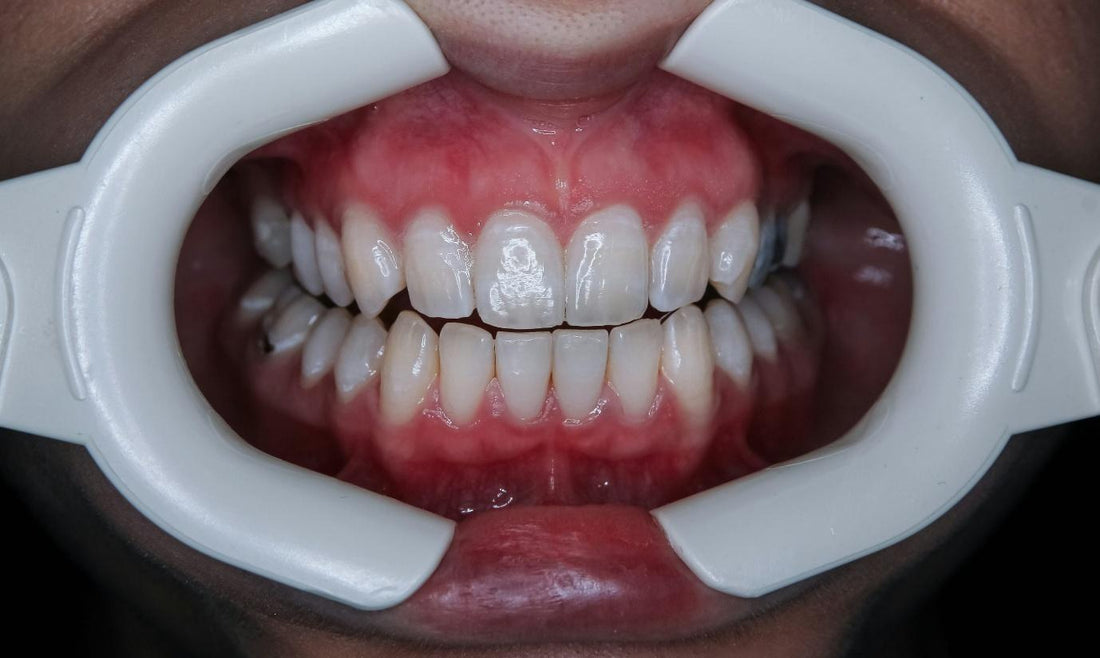Teeth Whitening Sensitivity: Causes, How to Avoid It & Tips

If you’ve recently had teeth whitening treatment and felt slight discomfort or sensitivity that wasn’t there before, you might have been experiencing teeth whitening sensitivity.
It’s not uncommon for people to have some slight tenderness after a whitening treatment. We understand that it can be concerning, but rest assured - it should go away.
Dr. Sanjay Patel covers everything you need to know — from the causes of teeth whitening sensitivity to things you can do to treat it — to put your mind at ease.
What causes sensitive teeth after whitening?
Teeth sensitivity after whitening isn’t uncommon. However, don’t panic — the effects are usually temporary.
It happens because whitening treatments (especially those with hydrogen peroxide or carbamide peroxide) influence temporary teeth responses, including:
Irritating the tooth nerves
The agents used in whitening penetrate the enamel, even down to the dentin layer, where your tooth nerves are housed.
This can cause temporary irritation to the nerve endings, making your teeth feel more sensitive to temperature, air, and pressure.
Whitening agents are quite powerful, so they need to be applied by a professional. Unfortunately, you may still experience some sensitivity, even when treated by the most seasoned professionals.
The sensitivity is usually temporary and will typically subside within 24-48 hours after treatment.
Dehydrating the teeth
Whitening treatments can reduce the amount of fluid in the enamel and dentin.
This dehydration can temporarily expose the nerve endings more, increasing sensitivity until your teeth rehydrate.
Open up the pores in the dentin
Peroxide opens microscopic channels in the dentin — sometimes referred to as tubules — which lead directly to the tooth pulp.
These open tubules make your nerve endings more receptive to hotter or colder temperatures until they begin to close.
It can take anywhere from a couple of days to a few weeks for dentin tubules to close fully, so don’t worry if you’re experiencing sensitivity for a little longer than a couple of days.
Gum Irritation
Sensitivity in your mouth might not come from your teeth — it could be your gums.
Because of the strength of the agents used, whitening agents can cause mild irritation if they get on your gums.
The sensation can feel like tooth sensitivity, and is often mistaken for it, but it’s soft tissue discomfort, which typically subsides quickly as your gums heal remarkably fast.
How to cope with teeth whitening sensitivity
Teeth whitening sensitivity can be irritating at best. Luckily, there are plenty of things that you can do to stave off discomfort.
These include:
Steering clear of hot or cold food and drink - Your teeth are likely to feel most sensitive during the first day or two following your treatment. Try to avoid anything too hot or too cold during this time. Choose food and drink served at room temperature, as this lessens the “zapping” sensation you get from things that are too hot or cold. If you can’t resist, try drinking them through a straw.
Avoiding acidic food and drink - Acidic items like fizzy drinks and citrus fruits can aggravate your mouth and heighten sensitivity, so it’s best to steer clear of them.
Using a desensitising toothpaste – Brushing with a desensitising toothpaste, or applying a desensitising gel, for the first 48 hours after your whitening treatment can help manage any discomfort.
Brushing with care - Use a toothbrush with soft bristles and rinse your mouth with lukewarm water to help reduce sensitivity.
Trying fluoride products - Toothpastes and mouthwashes that contain fluoride can help strengthen your enamel and reduce pain signals sent to your nerves.
Using a straw - Sipping drinks through a straw straight after whitening can help minimise contact between liquids and your teeth, making things a bit more comfortable.
Try medicated relief - Over-the-counter painkillers like ibuprofen or acetaminophen can help manage tooth sensitivity after teeth whitening. However, timing is key, and it's best to take them before the procedure to prevent or minimise discomfort.
What to consider when whitening sensitive teeth
If you already have sensitive teeth that aren’t caused by previous or recent treatment, you might feel stuck, possibly feeling like you can’t have teeth whitening treatment at all.
Don’t be discouraged. You can still undergo teeth whitening treatment even if you have sensitive teeth. Your dentist can usually work around sensitive teeth by offering a more thorough desensitising routine or by lowering the concentration of the whitening solution.
Here are some things you’ll likely need to consider when having a tooth whitening treatment:
Speak to your dentist first
Always consult a dental professional before starting any whitening treatment, especially if you already struggle with sensitivity. They can assess whether it’s suitable for you and suggest gentler alternatives if needed.
They can help diagnose underlying sensitivity issues.
Sensitivity can sometimes be a sign of issues like gum recession, tooth decay, or enamel erosion. These should be treated before any whitening is done, or you risk exacerbating the problem.
Prep your teeth in advance
Use a desensitising toothpaste for at least two weeks before your treatment. This can build up a bit of resistance and lessen discomfort afterwards.
Consider professional treatments over DIY kits
While shop-bought kits might be cheaper, in-practice whitening under the supervision of a dentist is often safer and more tailored to your needs, especially when it comes to managing sensitivity.
Limit acidic food and drink beforehand
Acidic substances can weaken enamel and make teeth more prone to sensitivity. Try to avoid them in the lead-up to your treatment to keep your teeth as strong as possible.
Plan for downtime
If your teeth are already prone to sensitivity, expect a short period of heightened discomfort after whitening. Make sure your schedule allows for a bit of downtime and self-care.
Teeth whitening products for sensitive teeth by Enlighten
Experience our gentle, non-invasive teeth whitening designed to deliver a radiant smile while keeping your teeth healthy.
Book an appointment with one of our certified dentists for professional whitening you can trust. Our clinical-grade whitening toothpaste helps tackle plaque and stains, while our Enlighten Serum toothpaste works to seal enamel micro-cracks and reduce sensitivity.
CTA button – Contact us today!
FAQs
Can you be allergic to teeth whitening?
Yes, it’s possible to be allergic to teeth whitening treatments.
Although it’s rare, some people can have allergic reactions to ingredients in teeth whitening products. Symptoms of an allergic reaction might include:
· Swelling of gums or lips
· Itching or burning sensations
· Rash or irritation around the mouth
If you suspect you’re suffering from an allergy or are showing any signs or symptoms listed, consult a dentist or doctor.
Anaphylactic shock is another, more extreme risk with allergies. If you’re experiencing symptoms, call 999 immediately.
How long will teeth be sensitive after whitening?
Tooth sensitivity is a common side effect and typically lasts:
· 24 to 48 hours for most people
· In some cases, up to a couple of weeks
The sensitivity happens because whitening agents temporarily open the pores in your enamel, exposing the inner nerves slightly. Using a sensitive toothpaste or a fluoride rinse can help ease the discomfort.
What are the side effects of teeth whitening?
Common side effects include:
1. Tooth Sensitivity – As mentioned above, usually mild and temporary.
2. Gum Irritation – If the whitening gel touches the gums, it can cause temporary redness or soreness. This can be avoided completely with a well-fitted, high-quality whitening tray.
3. Uneven Whitening – Especially if you have dental work like crowns or fillings that won’t bleach like natural enamel.
If you’re worried about side effects, but are interested in an Enlighten teeth whitening treatment, don’t worry. Our treatment is completely safe and is tailored for people with already sensitive teeth, letting them get the whitest possible B1 shade, too.






